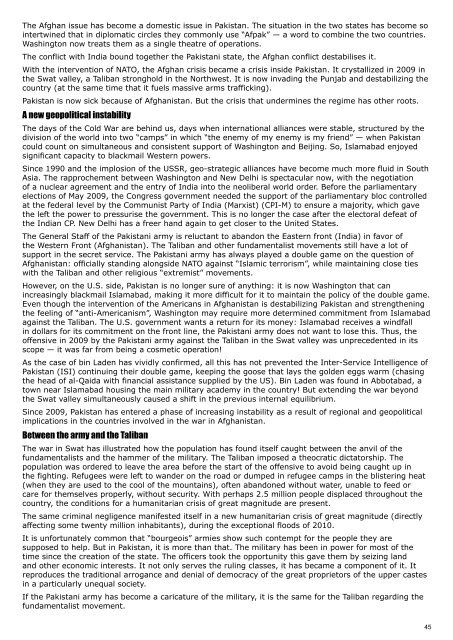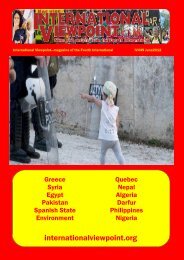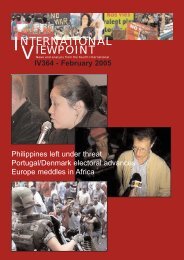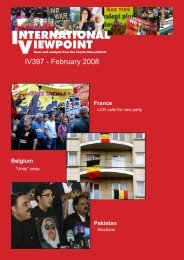download - International Viewpoint
download - International Viewpoint
download - International Viewpoint
Create successful ePaper yourself
Turn your PDF publications into a flip-book with our unique Google optimized e-Paper software.
The Afghan issue has become a domestic issue in Pakistan. The situation in the two states has become so<br />
intertwined that in diplomatic circles they commonly use “Afpak” — a word to combine the two countries.<br />
Washington now treats them as a single theatre of operations.<br />
The conflict with India bound together the Pakistani state, the Afghan conflict destabilises it.<br />
With the intervention of NATO, the Afghan crisis became a crisis inside Pakistan. It crystallized in 2009 in<br />
the Swat valley, a Taliban stronghold in the Northwest. It is now invading the Punjab and destabilizing the<br />
country (at the same time that it fuels massive arms trafficking).<br />
Pakistan is now sick because of Afghanistan. But the crisis that undermines the regime has other roots.<br />
A new geopolitical instability<br />
The days of the Cold War are behind us, days when international alliances were stable, structured by the<br />
division of the world into two “camps” in which “the enemy of my enemy is my friend” — when Pakistan<br />
could count on simultaneous and consistent support of Washington and Beijing. So, Islamabad enjoyed<br />
significant capacity to blackmail Western powers.<br />
Since 1990 and the implosion of the USSR, geo-strategic alliances have become much more fluid in South<br />
Asia. The rapprochement between Washington and New Delhi is spectacular now, with the negotiation<br />
of a nuclear agreement and the entry of India into the neoliberal world order. Before the parliamentary<br />
elections of May 2009, the Congress government needed the support of the parliamentary bloc controlled<br />
at the federal level by the Communist Party of India (Marxist) (CPI-M) to ensure a majority, which gave<br />
the left the power to pressurise the government. This is no longer the case after the electoral defeat of<br />
the Indian CP. New Delhi has a freer hand again to get closer to the United States.<br />
The General Staff of the Pakistani army is reluctant to abandon the Eastern front (India) in favor of<br />
the Western Front (Afghanistan). The Taliban and other fundamentalist movements still have a lot of<br />
support in the secret service. The Pakistani army has always played a double game on the question of<br />
Afghanistan: officially standing alongside NATO against “Islamic terrorism”, while maintaining close ties<br />
with the Taliban and other religious “extremist” movements.<br />
However, on the U.S. side, Pakistan is no longer sure of anything: it is now Washington that can<br />
increasingly blackmail Islamabad, making it more difficult for it to maintain the policy of the double game.<br />
Even though the intervention of the Americans in Afghanistan is destabilizing Pakistan and strengthening<br />
the feeling of “anti-Americanism”, Washington may require more determined commitment from Islamabad<br />
against the Taliban. The U.S. government wants a return for its money: Islamabad receives a windfall<br />
in dollars for its commitment on the front line, the Pakistani army does not want to lose this. Thus, the<br />
offensive in 2009 by the Pakistani army against the Taliban in the Swat valley was unprecedented in its<br />
scope — it was far from being a cosmetic operation!<br />
As the case of bin Laden has vividly confirmed, all this has not prevented the Inter-Service Intelligence of<br />
Pakistan (ISI) continuing their double game, keeping the goose that lays the golden eggs warm (chasing<br />
the head of al-Qaida with financial assistance supplied by the US). Bin Laden was found in Abbotabad, a<br />
town near Islamabad housing the main military academy in the country! But extending the war beyond<br />
the Swat valley simultaneously caused a shift in the previous internal equilibrium.<br />
Since 2009, Pakistan has entered a phase of increasing instability as a result of regional and geopolitical<br />
implications in the countries involved in the war in Afghanistan.<br />
Between the army and the Taliban<br />
The war in Swat has illustrated how the population has found itself caught between the anvil of the<br />
fundamentalists and the hammer of the military. The Taliban imposed a theocratic dictatorship. The<br />
population was ordered to leave the area before the start of the offensive to avoid being caught up in<br />
the fighting. Refugees were left to wander on the road or dumped in refugee camps in the blistering heat<br />
(when they are used to the cool of the mountains), often abandoned without water, unable to feed or<br />
care for themselves properly, without security. With perhaps 2.5 million people displaced throughout the<br />
country, the conditions for a humanitarian crisis of great magnitude are present.<br />
The same criminal negligence manifested itself in a new humanitarian crisis of great magnitude (directly<br />
affecting some twenty million inhabitants), during the exceptional floods of 2010.<br />
It is unfortunately common that “bourgeois” armies show such contempt for the people they are<br />
supposed to help. But in Pakistan, it is more than that. The military has been in power for most of the<br />
time since the creation of the state. The officers took the opportunity this gave them by seizing land<br />
and other economic interests. It not only serves the ruling classes, it has became a component of it. It<br />
reproduces the traditional arrogance and denial of democracy of the great proprietors of the upper castes<br />
in a particularly unequal society.<br />
If the Pakistani army has become a caricature of the military, it is the same for the Taliban regarding the<br />
fundamentalist movement.<br />
45









